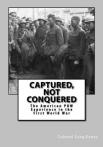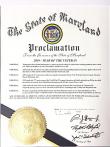By Linda D. Kozaryn
NIANTIC, CT, Feb. 15, 2022 – Harry Danos is a man with a history. A long, long history. At 97, Danos is one of the few remaining known survivors of the World War II Battle of Iwo Jima.
If you’re picturing a withered old man with one foot in the grave right now, forget it. Danos looks like he could be the captain of a fishing vessel off the Greek islands, where his family hails from originally.
According to Webster, Danos is a “nonagenarian,” but you’d never know it from his youthful looks or his engaging attitude. At 97, Danos is still going strong.
He lives alone here near the shoreline in a contemporary house he designed himself. Each weekend he drives his 2019 Hyundai about 75 miles north to visit his 95-year-old brother Leonard in Springfield, Mass.
Danos is eager to tell stories about his life, his careers and his time on the Japanese island. “I didn’t do it; I’m innocent,” he says with a sparkle in his eye and a grin on his face as he walks to the door to greet visitors.
He quickly relates some of his life’s accomplishments –
He worked at General Electric, enlisted and studied communications at Yale, became an architect post-war, designed college buildings, became a painter and took art students to Greece. He proudly displays his watercolors and some of his student’s work in his home art studio.
He also displays a large painting he did of the flag raising at Iwo Jima. It’s signed by fellow survivors and the man who flew the Enola Gay.
“Most people think the flag raising was done at the end of the battle,” Danas notes. “But it wasn’t. Raising the flag was just the beginning of the battle when we took Mt. Suribachi.”
Danos also contributed his architectural expertise to the design of the National Iwo Jima Memorial in New Britain, Conn. He wanted to help ensure fitting tribute was given to the Marines he had seen in action. “I’ll never forget their ability to survive.” More than 6,281 Americans of the 20,000 Americans who served on Iwo Jima died there.
Danos said he was in high school in Springfield, Mass., when he heard President Roosevelt on the radio saying that Dec. 7, 1941, would be a day that would live in infamy. “In that same speech, he also said that we – the United States of America – would prevail. His words served to unite our country as never before. It was then that I knew that I wanted to do my part.”
At the time, Danos was working at General Electric and was eligible for a deferment, but instead he signed up for the Army Air Corps. He spent a year attending a meteorology program before being sent to Yale to study communications.
He was commissioned a first lieutenant and sent to Iwo Jima with the 348th Service Group, 20th Army Air Force, Strategic Air Command. Danos said he enjoyed the luxury of going to outstanding schools and thought his time on “the gravy train while everybody else was in the thick of battle” would continue.
When he got orders to ship out, he found the tide had turned. When his ship stopped in Hawaii for water, Danos thought he was supposed to get off, but the ship went on to Saipan where the fighting was ongoing. “I wasn’t supposed to be going there,” he said. “I didn’t think this was my destiny.
“We went by Saipan and the only place left was Iwo Jima. I said, ‘God would not send me there,’ but he did.”
Danos said he arrived in the dead of night; it was black as the ace of spades and planes were taking off and landing overhead.
“It was truly a scary experience,” he said. “The beach was covered with spent brass shell casings. There was a tree about 4 feet tall that was riddled with bullets. It looked like Swiss cheese. I said, ‘Oh my God, they’re still fighting here!’”
For the next five months, more than 2,000 B-29s flew from the Marianas through Iwo Jima and dropped their bombs on Japan. “I welcomed the opportunity to trace the planes because I knew in the end that I might be contributing to the rescue of downed pilots,” Dano said.
Iwo Jima was an important location because of its close proximity to Japan and its’ strategic location for bombing runs, Danos recalled.
“It was my job to work with the tower to track and count all the planes as they flew out and as they returned in formation. If any failed to return, it was necessary to send out search and rescue crews to locate the missing planes and pilots.
“Every day was frightening,” he said. “We were being bombed every day. It was the first Japanese territory we ever took. In retrospect, I know that I was smelling death and volcanic ash. There were three cemeteries on the island. I walked all three of them. Every American who went down was honored.”
Danos said he wasn’t afraid of being killed even though the chances were very high that he would be. “I wondered, ‘What will happen to my mother if I didn’t return.' I was her first-born son.” He was concerned about her care since she moved to America when she was only 14.
Despite the horrors of the war and the toll it took on both American and Japanese lives, Danos’ war stories tend to focus on a lighter side. He said, for example, the Marines, Seabees and airmen had to adjust to living with some of the island’s nonhuman inhabitants like land crabs and bugs the size of your finger.
“Our tent was right on the edge of the B-29 runway. The land crabs loved toilet paper. I had built a desk out of Japanese ammunition boxes and I kept a roll of toilet paper under a helmet. One night at 4:30 a.m., I heard something moving around and I said, ‘If you want the toilet paper, have a good time, I’m not getting up to battle you guys.'”
Later on, he said, the Marines told him it wasn’t land crabs ripping off his toilet paper, it turned out to be Japanese digging up from underground and coming out into his tent.
The Japanese had created an underground fortress, an underground city, Danos said. Another night -- another tale -- while playing poker a hand came up out of the ground, he said. An American grabbed the Japanese soldier, pushed him back in the hole and they went on with their game.
“We hadn’t seen a female on Iwo in six months when some nurses came in. The men didn’t have much to offer, but they improvised. Danos recalled a spontaneous party in a Quonset hut with music and cocktails of pineapple juice and alcohol.
“These women were fascinating people because they didn’t refuse to dance with anyone who asked them for a dance,” he said. “One of the Marines said he asked a nurse for a date, and she said ‘Yes.’ But then he didn’t know where to take her because there were no roads on the island and the jeeps got stuck in the volcanic ash.
At one point, Danos said he had to deal with a much more serious situation. An aircraft came in and took out a large communications antenna vital to the base. Danos told his superiors the unit was down. Higher headquarters sent back their orders: “GET IT UP!”
Winging it, the young lieutenant told his leaders, “even if I knew how to do something like this I think it would take about 60 men.” To his chagrin, his commanders agreed.
“I had opened my mouth one too many times, he said with a laugh. “They let out the guard house, prisoners, anyone they had, I didn’t know what to do so I told everyone that until the tower was back up, all discharges were canceled.
“The only way discharges came through was radio teletype – I didn’t even finish the thought and they burst out the door. In three days they had a perfectly working antenna up. To this day I don’t know how they did it, where they got their instructions or how they organized themselves. All I had to do was stay out of the picture, and I did.”
Danos said at the end of the war he was transferred to several places. “When I got orders from Guam to Japan, he was getting on a general’s aircraft and a colonel asked him, “Where you going, young man? I said ‘Sir, I got orders.’” But the officer pointed at his colonel’s eagles and said, “Get the hell out.’ I remember muttering under my breath how P.O’d I was.”
Danos ended up on a second aircraft and when he arrived at his destination, he learned the general’s plane had crashed into a mountain near Tokyo with no survivors.
“I was supposed to be on that thing,” Danos said. “That was a magical moment for me. I knew I didn’t have control of the universe or anything else. I’m grateful for the Lord’s intervention.”
Danos stayed on in Japan to work with the occupation efforts. He said he had three Japanese co-workers who presented him with etchings and gifts he has forever valued. ‘It taught me that they were kind and compassionate human beings,” he said. “I found that the enemy had become my friends.”
Following his tour of duty, Danos went to school on the GI Bill at Syracuse University to study architecture and engineering. He then worked as an architect and designed state projects and several buildings at the University of Connecticut, and in the town of Niantic where he resides today.
After a career in architecture, he began painting watercolors and began to teach and set up trips to Greece for his students. “I still communicate with people who went over with me 20 or even 30 years ago. They still write to me.”
Danos’s experience in Iwo Jima gave him a lifelong appreciation for the military. “The command structure taught me to value order and structure. The training I received helped me in my career to make decisions and accomplish goals. It also taught me that we live in the greatest nation on earth because of those who have served.”
He advises young people: “You belong to the greatest country in the world and don’t take it lightly. Others have sacrificed so that you can carry on with your independence, your individuality, and nobody wants to take it away.”
At the end of Danos’ visit with fellow albeit younger veterans, guest Elaine Schieffer was asked to sing the national anthem as she often does at veterans’ events. Danos and friends stood tall as the historic notes sounded in the art studio. To some it might have seemed kind of hokey, but for those in the room, it was beautiful, a fitting close to a patriotic day.
Sitting in his art studio at his home in Niantic, Conn., Harry Danos talks about his wartime experiences during WWII's Battle of Iwo Jima.
Harry Danos, grateful to be alive and kickin'
Niantic, CT
February 18, 2022
Submitted by:
Linda D. Kozariyn



